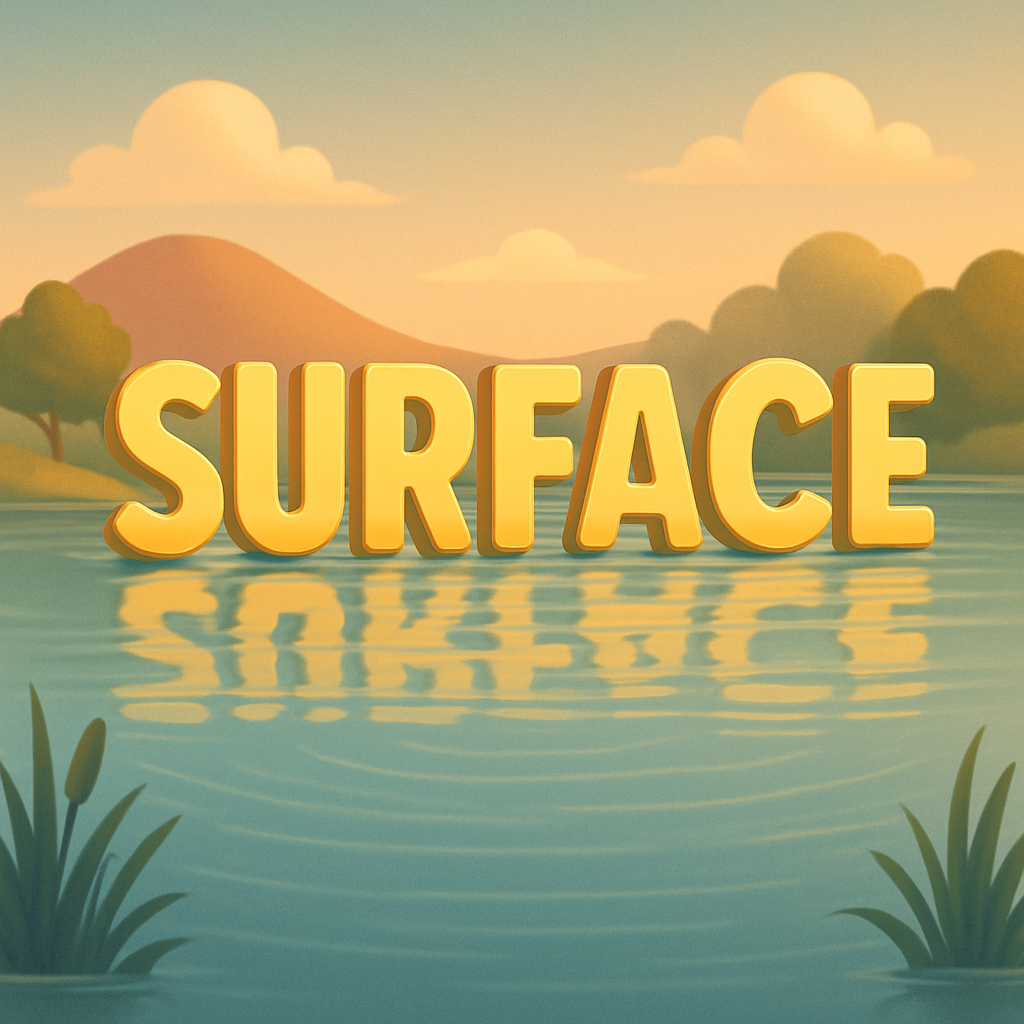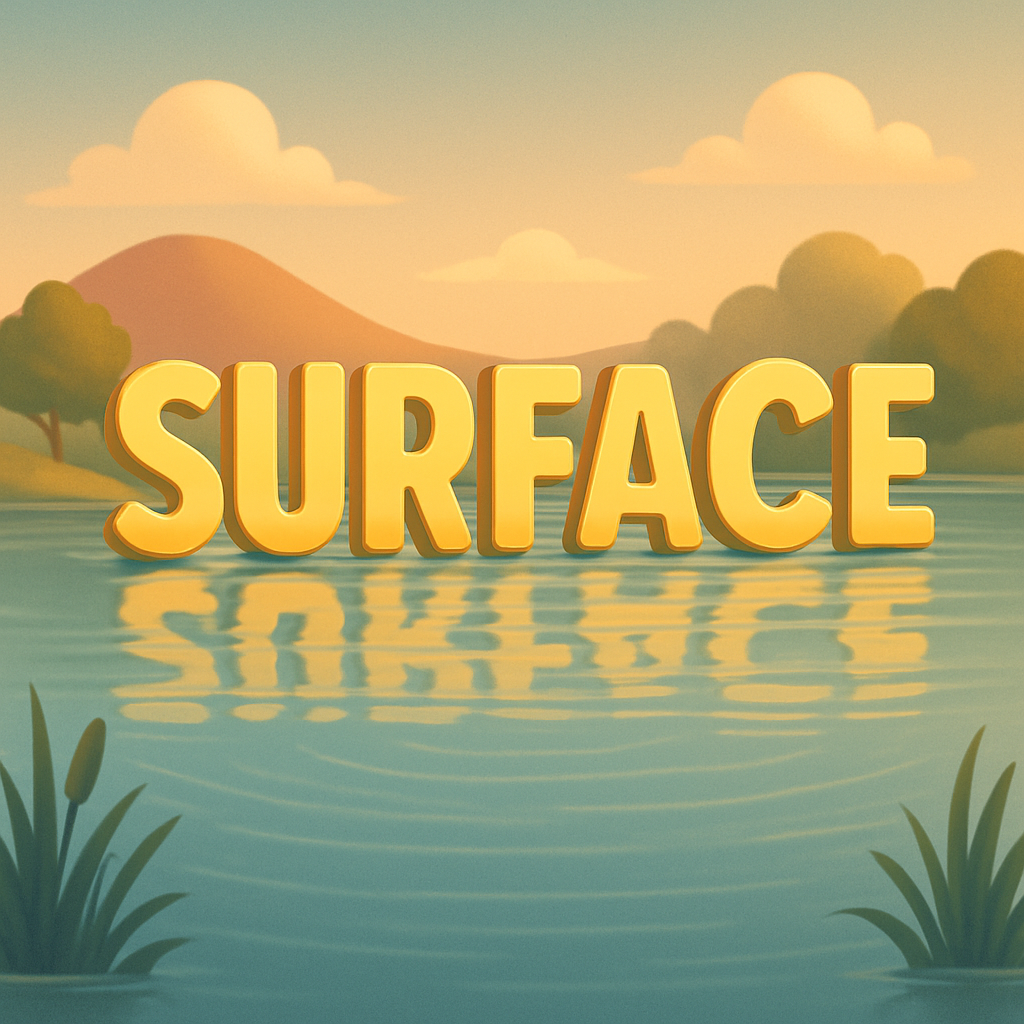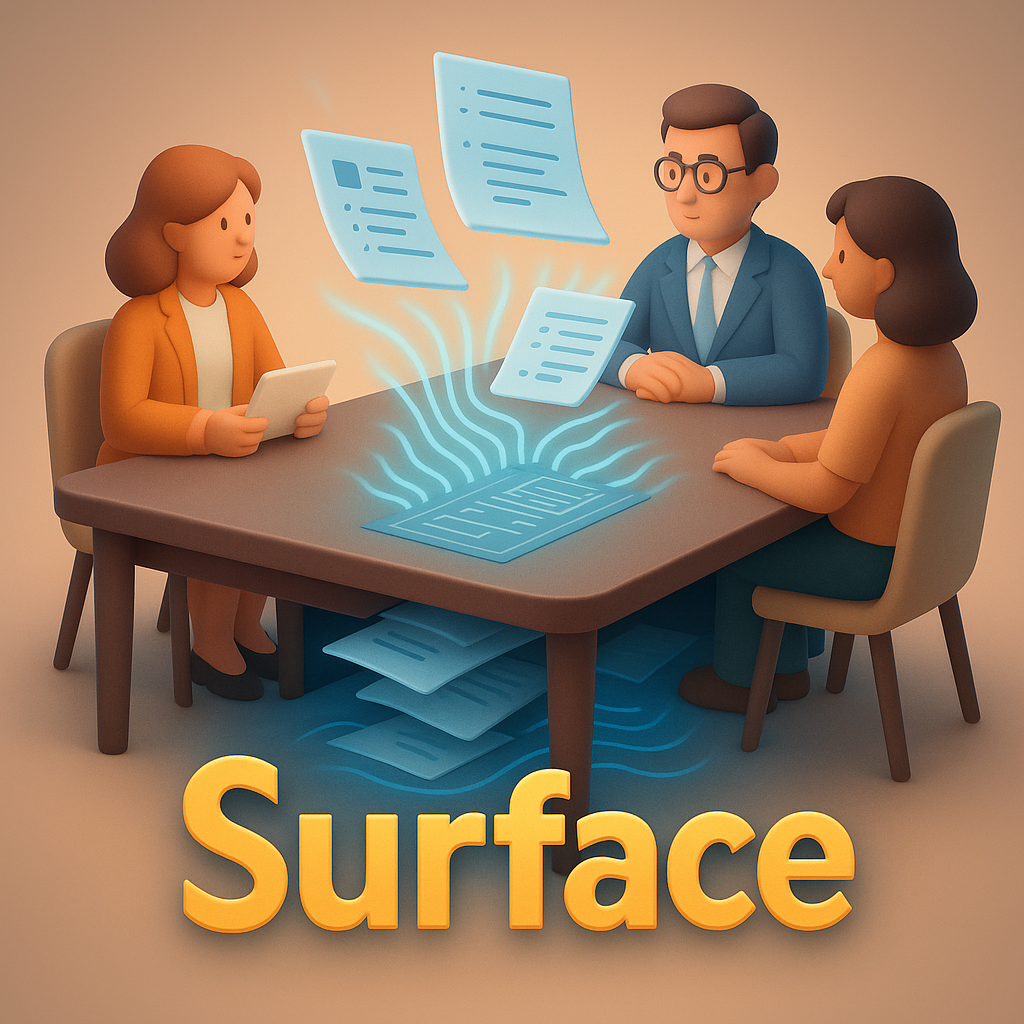Surface
Definition
Surface refers to the outermost layer or boundary of an object or area, often distinguishing its external appearance from its inner substance.
Parts of Speech
- Noun
- Verb
- Adjective
Pronunciation
American English
- IPA Pronunciation: /ˈsɜːr.fɪs/
- Respelling: SUR-fis
British English
- IPA Pronunciation: /ˈsɜː.fɪs/
- Respelling: SUR-fis
Etymology
The word "surface" originates from Middle French "surface," derived from Latin "superficies," meaning "top or upper layer." It combines "super-" (above) and "facies" (face or appearance).
Derivatives
- Surfacial (adjective)
- Surface-level (adjective)
- Resurface (verb)
- Surfacing (noun/verb)
- Surfaceable (adjective, rare)
Synonyms
- Exterior
- Face
- Layer
Antonyms
- Interior
- Inside
- Core
Usage
The noun "surface" is often used to describe the outermost part of an object, as in "The surface of the table is smooth." As a verb, it refers to appearing or coming into view, as in "New details surfaced during the investigation."
Related Terms
- Plane: A flat or level surface.
- Coating: A layer applied to a surface.
- Texture: The feel or appearance of a surface.
Detailed Definitions
Noun
- The outermost layer of an object: Refers to the external boundary or covering of an object or area.
- Example: "The surface of the water was calm."
- An area of a flat or curved plane: Refers to a two-dimensional space on an object.
- Example: "The surface of the sphere was glossy."
Verb
- To come to the surface or become visible: Refers to emerging from concealment.
- Example: "Details of the plan surfaced during the meeting."
- To apply a coating or covering to a surface: Refers to treating or finishing the external layer of something.
- Example: "They surfaced the road with asphalt."
Adjective
- Related to the outer layer or appearance: Refers to anything pertaining to the exterior.
- Example: "The problem seemed surface, but deeper issues were present."
surface



🇨🇳 Mandarin
- 表面
- IPA: /pjaʊ̯˥˩ mjɛn˥˩/
- Respelling: biaǒmiàn
- 表层
- IPA: /pjaʊ̯˥˩ tsʰʊŋ˥˩/
- Respelling: biaǒcéng
🇮🇳 Hindi
- सतह
- IPA: /sətəh/
- Respelling: sat̪ah
- ऊपरी भाग
- IPA: /upri bʱag/
- Respelling: oopri bhaag
🇪🇸 Spanish
- superficie
- IPA: /supeɾˈfiθje/
- Respelling: superficie
- superficie terrestre
- IPA: /supeɾˈfiθje teˈrestɾe/
- Respelling: superficie terrestre
🇫🇷 French
- surface
- IPA: /syʁ.fas/
- Respelling: surface
- superficie
- IPA: /sypɛʁfisj/
- Respelling: superficie
🇸🇦 Modern Standard Arabic
- سطح
- IPA: /saʔhˤ/
- Respelling: sath
- ظاهرة
- IPA: /ðaːhira/
- Respelling: Zahira
🇧🇩 Bengali
- সমতল
- IPA: /ʃomotɔl/
- Respelling: shomotal
- সুপারিশ
- IPA: /suparish/
- Respelling: suparish
🇷🇺 Russian
- поверхность
- IPA: /pɐˈvʲerxʂnʲɪsʲtʲ/
- Respelling: poverkhnost'
- граница
- IPA: /ˈɡranʲɪtsə/
- Respelling: granitsa
🇵🇹 Portuguese
- superfície
- IPA: /su.pɨɾˈfi.si/
- Respelling: superfície
- superfície terrestre
- IPA: /su.pɨɾˈfi.si tɛˈʁɛʃtɾɨ/
- Respelling: superfície terrestre
🇮🇩 Indonesian
- permukaan
- IPA: /pərmukaʔan/
- Respelling: permukaan
- lapisan atas
- IPA: /lapisan atas/
- Respelling: lapisan atas
🇩🇪 German
- Oberfläche
- IPA: /ˈoːbɐflɛçə/
- Respelling: Oberfläche
- Fläche
- IPA: /ˈflɛçə/
- Respelling: Fläche
🇯🇵 Japanese
- 表面
- IPA: /hjoː.mɛɴ/
- Respelling: hyōmen
- 表層
- IPA: /hjoː.soː/
- Respelling: hyōsō
🇻🇳 Vietnamese
- bề mặt
- IPA: /ɓɛ˧ˀ˨ʔ məːt˧ˀ˨ʔ/
- Respelling: bề mặt
- lớp ngoài
- IPA: /lɔ˧ˀ˨ʔ ŋɔj˧ˀ˨ʔ/
- Respelling: lớp ngoài
🇰🇷 Korean
- 표면
- IPA: /pʰjo.mʌn/
- Respelling: pyomyeon
- 표층
- IPA: /pʰjo.tɕʰʌŋ/
- Respelling: pyocheung
🇹🇷 Turkish
- yüzey
- IPA: /jyˈzej/
- Respelling: yüzey
- yüzey alanı
- IPA: /jyˈzej aˈlaːnɯ/
- Respelling: yüzey alanı
🇵🇰 Urdu
- سطح
- IPA: /sət̪ʰ/
- Respelling: sath
- اوپری سطح
- IPA: /upri sət̪ʰ/
- Respelling: upri sath





